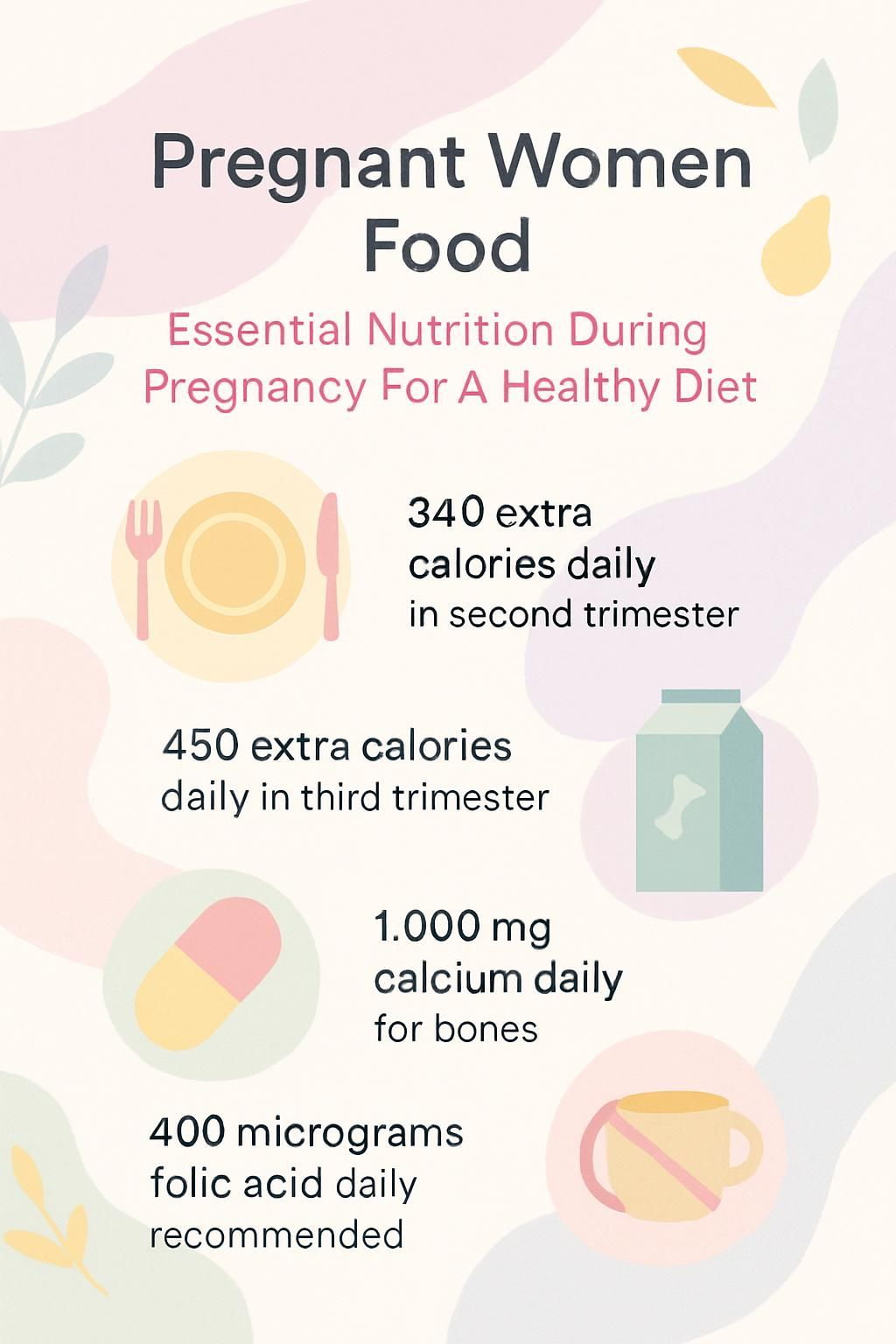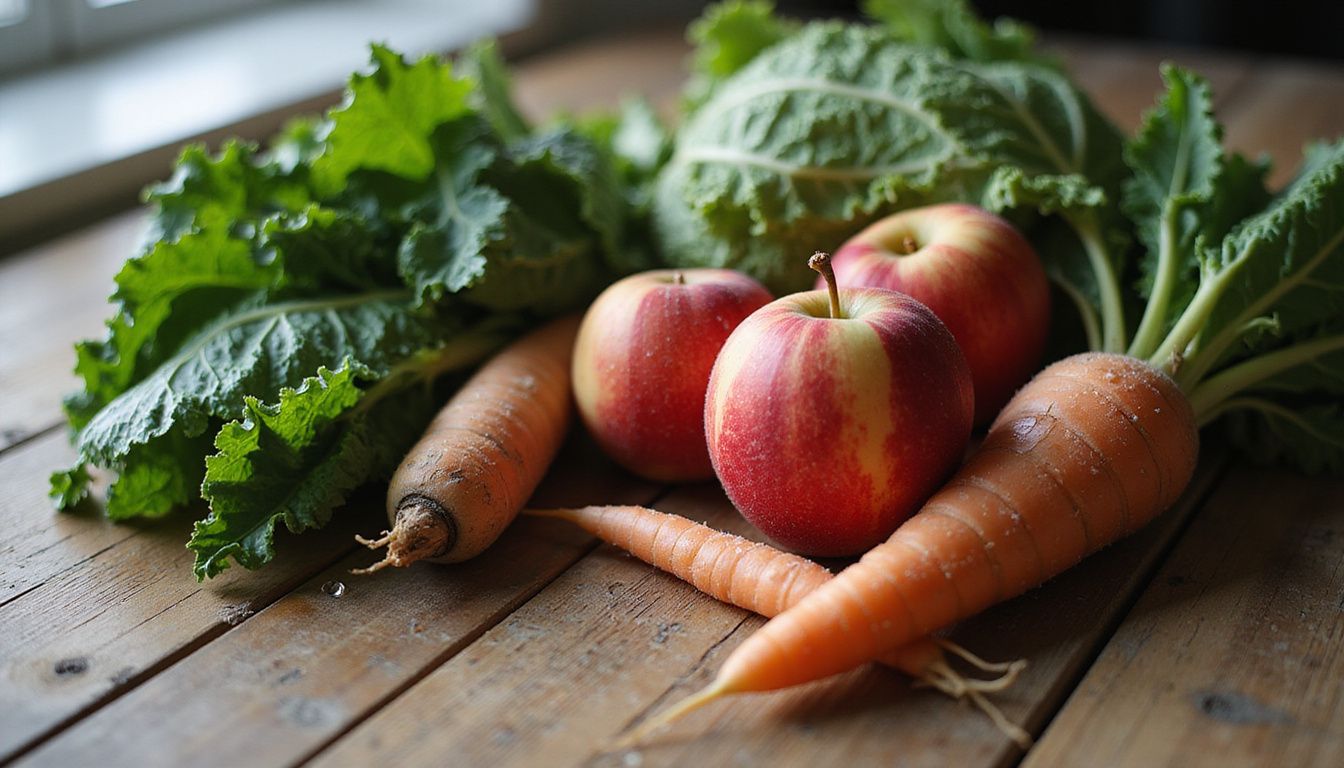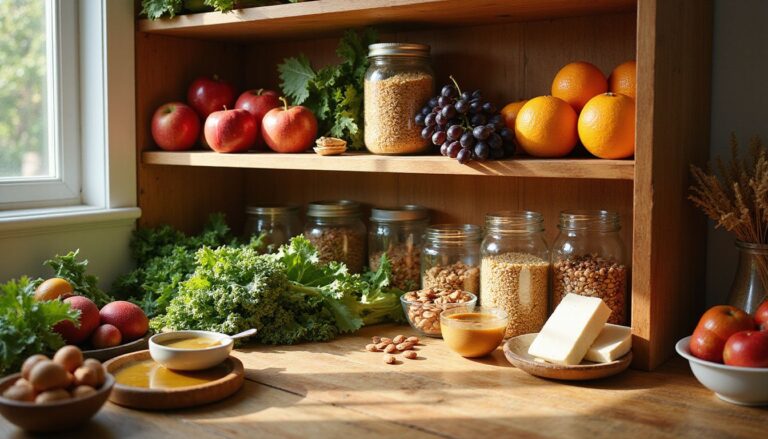Pregnant Women Food: Essential Nutrition During Pregnancy For A Healthy Diet
Our Nutrition Assistant AI Suite will transform your body. You will lose fat, get toned, and build muscle. Gain confidence and optimal health.
Worried about what to eat for a healthy pregnancy? Good nutrition during pregnancy helps prevent certain birth defects and supports steady growth for your baby.
Research from groups like ACOG and the CDC shows a healthy diet centers on protein, fruits, vegetables, and whole grains, with more calories in later trimesters. This guide explains smart food choices, foods to avoid in pregnancy, and simple habits that make mealtimes safer and easier for you and your unborn baby.
Keep reading for clear tips that fit into real life.
Key Takeaways
- Expect about 340 extra calories daily in the second trimester and 450 in the third. Aim for protein, produce, and whole grains.
- Take at least 400 micrograms of folic acid daily before conception and in early pregnancy to help prevent neural tube defects such as spina bifida.
- Get 1,000 mg of calcium per day from pasteurized dairy or fortified soy milk to build baby’s bones and protect your own.
- Avoid high-mercury fish like swordfish and shark, unpasteurized dairy, and raw meats or eggs. Keep caffeine below 200 mg per day.
- Reduce foodborne illness risk by washing produce well, cooking meats to safe temperatures, and storing leftovers correctly.

Why is Nutrition Important During Pregnancy?

Food is the raw material your body uses to build a healthy pregnancy. Quality fuel supports you now and your baby for years to come.
How does nutrition support maternal health?
A balanced eating plan helps your body handle the increased demands of pregnancy. Most people need about 340 extra calories in the second trimester and 450 in the third.
Steady nutrition supports healthy weight gain and can ease nausea or constipation. Iron-rich foods, such as lean meat, beans, and fortified cereals, lower the risk of anemia, a condition where you have too few healthy red blood cells.
Hydration matters too. Drinking enough water can reduce headaches and urinary tract infections. Protein from eggs, dairy products, poultry, and beans supports cell growth and repair. Vitamins and minerals back up your immune system and energy levels.
I noticed fewer headaches and less fatigue after adding leafy greens and two extra glasses of water each day.
How does nutrition promote fetal development?
Food choices shape fetal growth from the start. Folic acid, a form of vitamin B9, helps close the neural tube, which becomes the brain and spinal cord. Experts recommend 400 micrograms every day, especially early on.
Iron supports extra blood production and oxygen delivery to the baby. Calcium from dairy or fortified soy milk builds bones and teeth. Omega-3 fats from salmon or sardines support brain and eye development. Protein from eggs, beans, meat, and nuts fuels tissue growth.
I added lentils and spinach for iron and asked my clinician about prenatal supplements. Eating a variety of protein foods and fresh fruit helped me meet daily needs and support healthy birth weight.
Essential Nutrients for a Healthy Pregnancy
Each nutrient during pregnancy has a job. Getting enough of the big ones helps you cover the basics your baby needs to grow.
Why is folic acid important for neural tube development?
Folic acid lowers the risk of serious neural tube defects that affect the brain and spine. The first 28 days after conception are the most critical, and many people are not yet aware they are pregnant during that time.
Health groups advise at least 400 micrograms per day before pregnancy and through early weeks. Find folic acid in fortified breakfast cereals, leafy greens, beans, citrus fruits, and prenatal vitamin supplements.
Some medicines, such as anti-epileptic drugs, may raise your folate needs, so talk with your healthcare provider about dosing and safe supplement choices.
How does iron help with blood production and oxygen transport?
Iron helps your body make hemoglobin, the protein in red blood cells that carries oxygen. Blood volume can increase by nearly half during pregnancy, so your iron needs rise sharply.
Too little iron can cause anemia, which may lead to tiredness and higher risks for you and your baby. Good sources include beans, lentils, spinach, and lean meats. Pair plant iron with vitamin C foods, like tomatoes or oranges, to boost absorption.
Many prenatal vitamins include iron. Ask your provider about the right amount for you.
Why do pregnant women need calcium for bones and teeth?
Calcium builds your baby’s bones and teeth. If your diet does not supply enough, your body will pull calcium from your bones.
Aim for 1,000 mg per day. Choose pasteurized dairy like yogurt, milk, and cheese, or fortified soy milk. These foods also provide protein and B vitamins.
Getting enough calcium protects your bones during pregnancy and beyond.
What role do omega-3 fatty acids play in brain and eye development?
Omega-3 fats, especially DHA and EPA, support brain and eye development. Salmon, sardines, and herring are rich sources with low mercury.
Include two portions of oily fish per week, and avoid high-mercury fish like king mackerel and certain large tuna species. Fish liver oil contains vitamins A and D, but too much vitamin A is unsafe in pregnancy. Check with your clinician before using it.
I ate cooked salmon twice a week in the third trimester. Energy improved, and I felt confident about supporting vision and brain growth while avoiding food poisoning from raw seafood.
How does protein support cell growth and repair?
Protein builds and fixes cells in your body and your baby’s body. Needs rise during pregnancy to support the fetus, placenta, and your own changing tissues.
ACOG suggests at least 71 grams of protein per day. Eggs, dairy, beans, tofu, fish like salmon, and lean meat are easy ways to get there.
Adding a boiled egg or tofu at breakfast can help you meet daily goals and feel stronger as your body changes.
Best Foods to Eat During Pregnancy
Nutrient-dense foods help you feel better, keep energy steady, and support your baby’s development.
How do dairy products provide calcium and protein?
Milk, yogurt, and cheese supply high-quality protein that supports cell growth and repair. They are also rich in calcium and potassium for strong bones and teeth.
One cup of milk has about 300 mg of calcium and 8 grams of protein. Choose low-fat or fat-free versions to limit saturated fat while keeping nutrients.
Stick with pasteurized options. Safe choices include hard cheeses like cheddar and parmesan, pasteurized semi-hard cheeses like edam, mozzarella, cottage cheese, paneer, ricotta, cream cheese, halloumi, pasteurized goat cheese without rind, yogurt, and ice cream.
Why are legumes good sources of fiber, folate, and iron?
Legumes include lentils, peas, beans, chickpeas, soybeans, and peanuts. They provide fiber for digestion, folate for neural tube development, and iron for blood building.
One cup of cooked lentils can offer 15 grams of fiber and a large share of your daily folate. Combine legumes with vitamin C foods, such as tomatoes or oranges, to improve iron absorption.
They also add protein and some calcium, which makes them a helpful choice in a balanced diet.
What are the benefits of sweet potatoes for vitamin A?
Sweet potatoes are rich in beta-carotene, which your body converts into vitamin A. This vitamin supports fetal growth, cell development, and organ formation.
One medium sweet potato can supply more than 100 percent of daily vitamin A needs. The fiber helps with digestion and can reduce constipation.
I often baked a sweet potato to pair with grilled fish or added cubes to salads. It kept meals simple and nutrient-dense.
Why is salmon rich in omega-3 fatty acids?
Salmon contains DHA and EPA, two omega-3 fats vital for brain and eye development. Cold-water fish like salmon naturally store more of these healthy fats.
You can enjoy up to two portions of oily fish per week during pregnancy. Salmon is low in mercury and fits well into a healthy diet.
Baked salmon with brown rice and leafy greens is a simple, balanced dinner that many prenatal dietitians support.
How do eggs supply protein and choline?
Eggs are a compact source of protein, which supports growth for you and your baby. They also provide choline, a nutrient that helps brain development and supports memory and learning.
In the United Kingdom, eggs with the British Lion or Laid in Britain mark are considered safe to eat raw or partially cooked. Otherwise, cook eggs until the yolk and white are firm.
Eggs fit easily into meals without adding many calories.
What vitamins and minerals do broccoli and dark leafy greens offer?
Broccoli and leafy greens like spinach and kale deliver fiber, vitamin C for iron absorption, vitamin K for blood clotting, and vitamin A for vision and immunity.
They also provide calcium, iron, folate, and potassium. These nutrients support maternal health and fetal development.
Adding a broccoli salad or sautéed kale at dinner helped me meet daily goals while keeping meals tasty.
Why choose lean meats for iron and protein?
Lean beef, pork, and chicken offer high-quality protein and heme iron, which your body absorbs more easily than plant iron. Both support oxygen transport and tissue repair.
Iron needs are higher during pregnancy. Three ounces of beef provide about 2.7 mg of iron. Choosing lean cuts helps limit saturated fat while meeting protein needs.
How do whole grains provide fiber and sustained energy?
Oats, quinoa, brown rice, and barley provide B vitamins, magnesium, fiber, and plant protein. They digest slowly and release energy over time.
Fiber supports regular bowel movements and gut health, both common concerns in pregnancy. Switching from refined grains to whole grains often improves comfort and energy between meals.
Fortified whole-grain cereals can also supply extra vitamins and minerals.
What antioxidants and vitamins do berries contain?
Berries such as strawberries, blueberries, and raspberries supply vitamin C for iron absorption, dietary fiber for digestion, and antioxidants that protect cells.
They have a low glycemic index, so they do not spike blood sugar quickly. Their high water content also supports hydration.
I liked topping yogurt with mixed berries in the morning. It was filling and helped prevent constipation.
- Vitamin C per cup: up to 40 mg
- Fiber per cup: about 4 grams
- Carbohydrates per cup: about 15 to 20 grams
Why are avocados good for healthy fats?
Avocados provide monounsaturated fats, which support heart health for you and brain development for your baby. One avocado has roughly 20 grams of healthy fat.
They also supply fiber, folate, potassium, vitamin K, and vitamin E. Potassium can help maintain normal blood pressure.
Slice avocado over salad with lean protein or add it to whole-grain toast for an easy, nutrient-rich choice.
What Foods Should Pregnant Women Avoid?
Some foods raise the risk of infection or exposure to harmful substances. Make safe swaps to protect yourself and your baby.
Why avoid high-mercury fish during pregnancy?
High-mercury fish, such as swordfish, shark, and marlin, can affect a developing brain and nervous system. Mercury builds up in the body and crosses the placenta.
Tuna has more mercury than many fish. Limit tuna to 2 steaks or 4 small cans per week. Choose lower-mercury seafood like salmon or sardines instead.
Smart seafood choices support brain development while limiting long-term risks.
What are the risks of raw or undercooked seafood, meat, and eggs?
Raw or undercooked items can carry harmful bacteria and parasites. Sushi made with raw fish, rare beef, or any dish with uncooked eggs can raise your risk of illnesses such as salmonella or toxoplasmosis.
Raw shellfish may contain viruses or bacteria from polluted waters. Cold-smoked fish not heated before eating can contain Listeria, a dangerous germ for pregnancy.
Cook foods fully, and choose eggs that are safe to eat raw only if clearly labeled by safety schemes like British Lion. These steps lower the chance of miscarriage or preterm labor due to infection.
Why skip unpasteurized dairy products?
Unpasteurized milk and soft cheeses like brie, camembert, chèvre, danish blue, gorgonzola, and roquefort may contain Listeria. This bacterium survives unless the food is cooked until steaming hot.
Listeria can cause severe illness, miscarriage, or stillbirth. Pick pasteurized milk, yogurt, and cheese to reduce risk while still meeting calcium needs.
When should deli meats be avoided or heated thoroughly?
Deli meats and ready-to-eat cold cuts, such as salami, pepperoni, chorizo, and prosciutto, can carry Listeria. Heat hot dogs and luncheon meats until steaming hot before eating.
Skip refrigerated pâté, meat spreads, and refrigerated smoked seafood. The CDC notes pregnant people are much more likely to become ill from Listeria. Heating these foods helps protect your pregnancy.
How much caffeine is safe during pregnancy?
Keep caffeine under 200 mg per day. A mug of instant coffee has about 100 mg, filter coffee about 140 mg, and tea about 75 mg.
Cola has roughly 40 mg per can, and a 250 ml energy drink has about 80 mg. Chocolate adds smaller amounts. Track all sources from drinks and snacks to stay within the limit.
Switching some coffee servings to herbal tea helped me stay under the limit in the first trimester.
Why is alcohol harmful during pregnancy?
Alcohol crosses the placenta and can harm your baby at any stage. No amount is known to be safe.
Exposure increases the risk for Fetal Alcohol Spectrum Disorders, which can cause learning problems, low birth weight, and physical differences. Health agencies recommend avoiding wine, beer, and spirits throughout pregnancy.
One mom in my class shared how a relative struggled with learning issues linked to prenatal alcohol exposure. Stories like this make the risks feel very real.
How to Practice Food Safety During Pregnancy
A few simple steps can cut the risk of foodborne illness. Think clean, separate, cook, and chill.
How to properly wash fruits and vegetables?
Rinse all produce under running water before eating, cutting, or cooking. Scrub firm items, like oranges and sweet potatoes, with a clean brush.
Do not use soap or bleach. Dry with a clean towel. Cook enoki mushrooms thoroughly and keep them refrigerated, since they have been linked to Listeria outbreaks.
Keep washed produce separate from raw meat or sausage to avoid cross-contamination.
What are safe cooking temperatures for meat and eggs?
Cook beef and pork to at least 145°F, then rest for 3 minutes. Cook poultry to 165°F. Use a food thermometer to check internal temperatures.
Cook eggs until the yolks and whites are firm, unless eggs are clearly labeled safe for raw use, such as British Lion eggs in the UK. Heat soft cheeses until steaming hot if they are not pasteurized.
Using a thermometer gave me peace of mind with pink-centered steaks and egg dishes.
How to avoid cross-contamination in the kitchen?
Wash hands with soap and warm water after handling raw meat, fish, or eggs. Clean knives, countertops, and cutting boards before preparing ready-to-eat foods.
Store raw poultry, seafood, and meat away from salads and cooked items. Use separate utensils and cutting boards for raw and ready foods. Keep a dedicated board for produce and another for animal proteins.
These habits lower the chance that harmful germs move from one food to another.
What are proper food storage methods to prevent spoilage?
Refrigerate perishable foods quickly. Store raw and cooked foods in separate sealed containers. Label leftovers with dates so you can track freshness.
Refrigerate leftovers within two hours and eat them within three to four days. Reheat leftovers until steaming hot. Keep your fridge at 40°F or below.
These steps reduce the risk of foodborne illness and keep your meals safe.
When and How to Use Prenatal Vitamin and Mineral Supplements
Supplements fill gaps. Food stays first, but a good prenatal can be a strong backup.
When are prenatal supplements recommended?
Most clinicians suggest a prenatal supplement before conception or as soon as you find out you are pregnant. This supports folic acid intake early, when the neural tube is forming.
People with special diets, such as vegans, or with certain medical conditions may need extra vitamins and minerals. Your provider can guide dosing if you take anti-epileptic drugs or have a history of deficiencies.
How to choose the right prenatal vitamins?
Look for at least 400 micrograms, 0.4 mg, of folic acid. Avoid supplements with high doses of vitamin A, since excess vitamin A can cause birth defects.
Ask your healthcare provider if you might need extra iron, calcium, omega-3s, or vitamin B12. Read labels to confirm safe amounts that match pregnancy guidelines.
Trusted pregnancy and baby emails from health organizations can alert you to updates in nutrition guidance.
Why is Hydration Important During Pregnancy?
Water moves nutrients where they need to go. It also helps your body handle a higher blood volume.
What are the benefits of staying hydrated?
Hydration supports digestion, helps prevent constipation, and may reduce urinary tract infections. Many people also notice fewer headaches and less fatigue.
As blood volume rises during pregnancy, fluids keep circulation steady and support kidney function. I kept a water bottle nearby, which eased nausea and boosted energy.
How much water should pregnant women drink daily?
Most experts suggest eight to twelve cups of water per day, about 64 to 96 ounces. Pale yellow urine usually means you are well hydrated.
Increase fluids if you are vomiting, have diarrhea, or sweat more than usual. Water helps form amniotic fluid and carries nutrients to your baby.
Carrying a reusable bottle is a simple way to track intake through the day.
How to Manage Pregnancy Cravings and Aversions?
Cravings and aversions are common. With a few swaps, you can still meet nutrition goals.
What are healthier alternatives for common cravings?
Sweet tooth hitting hard? Try berries with Greek yogurt for protein, fiber, and vitamin C. Want something creamy or crunchy? Avocado or a small handful of nuts offers healthy fats and staying power.
Swap chips for hummus with whole-grain crackers. Hard-boiled eggs make a quick protein snack that steadies blood sugar.
How can you overcome aversions to essential foods?
Blend spinach or kale into smoothies. Roast or steam vegetables to change texture and add flavor with herbs or spices.
If aversions limit key nutrients, talk with a healthcare provider or dietitian. Pair disliked foods with familiar tastes, or fold them into mixed dishes like soups or omelets.
What Are Some Sample Meal Ideas for Pregnant Women?
Quick meal ideas make healthy eating easier on busy days. Mix and match to fit your taste and schedule.
Breakfast: Greek yogurt with berries and granola
Greek yogurt provides about 250 mg calcium and around 10 grams of protein per serving. Berries add antioxidants, vitamin C, and fiber. A small portion of whole-grain granola adds crunch and extra fiber for lasting energy.
This was my go-to in the second trimester. It kept me full until lunch and took only minutes to make.
Lunch: Grilled chicken salad with leafy greens and avocado
Grilled chicken supplies lean protein and iron. Leafy greens bring folate, calcium, and vitamins A, C, and K.
Avocado adds healthy fats, potassium, and vitamin E. This mix covers many pregnancy needs in one simple bowl.
Dinner: Baked salmon with quinoa and steamed vegetables
Baked salmon provides omega-3s and protein. A 3-ounce serving delivers a strong dose of DHA and EPA for brain and eye development.
Quinoa supplies complete plant protein, fiber, and B vitamins. Steamed vegetables, such as broccoli, carrots, or sweet potatoes, add vitamins A, C, and K, potassium, and more fiber.
On busy nights, this dinner felt balanced without much prep.
Snacks: Nuts, fruit, or hummus with whole-grain crackers
Nuts give protein, fiber, and healthy fats. Fruit adds hydration, vitamins, and color.
Hummus with whole-grain crackers combines protein and complex carbs for steady energy. It is an easy option at home or on the go.
Conclusion
A healthy diet, with protein, fruits, vegetables, and whole grains, gives your baby the building blocks for growth. Safe choices, smart portions, and enough water help you feel better day to day.
A prenatal vitamin can support gaps in your diet, and your clinician can help tailor choices to your needs. Use food safety basics, avoid high-risk items, and choose nutrient-dense foods that you enjoy.
This approach to nutrition during pregnancy supports a healthy start for your child and steadier energy for you. For personal medical advice, consult your healthcare provider.
FAQs
1. What are the most important nutrients for pregnant women to include in their diet?
Pregnant women need protein, calcium, iron, folic acid, and omega-3 fatty acids. These nutrients support fetal growth and help prevent birth defects. For example, research from the Centers for Disease Control and Prevention shows that getting enough folic acid lowers the risk of neural tube defects by up to 70 percent.
2. How much weight should a woman gain during pregnancy?
Weight gain depends on pre-pregnancy body mass index (BMI). The Institute of Medicine recommends gaining 25 to 35 pounds if starting at a healthy BMI. Women with lower or higher BMIs may need different targets; healthcare providers can give tailored advice based on individual needs.
3. Which foods should pregnant women avoid for safety?
Pregnant women should not eat raw fish like sushi or undercooked meat because these can carry harmful bacteria or parasites. Unpasteurized dairy products and deli meats also pose risks due to possible listeria contamination according to Food and Drug Administration guidelines.
4. Can you share an example of how nutrition made a difference during pregnancy?
A patient shared that eating more leafy greens helped raise her iron levels after her doctor found she was anemic in her second trimester. She added spinach salads twice each week along with vitamin C-rich oranges which improved her energy within one month as confirmed by follow-up blood tests.
Summary: Pregnant women benefit from balanced meals rich in key nutrients such as protein, calcium, iron, folic acid, and omega-3s while avoiding unsafe foods like raw seafood or unpasteurized cheese; proper nutrition supports both mother’s health and baby’s development throughout pregnancy.







